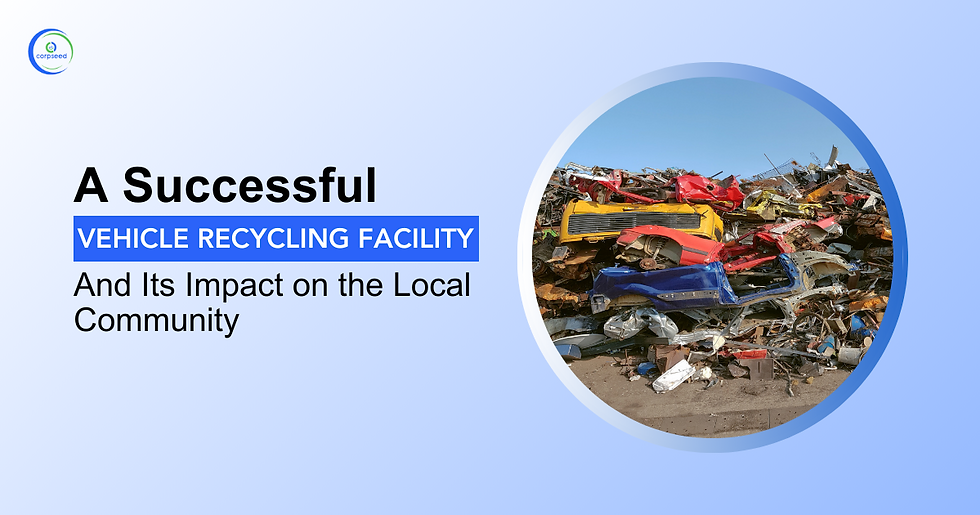A Successful Vehicle Recycling Facility and Its Impact on the Local Community
- Jagriti Agarwal
- Apr 29, 2024
- 3 min read

Introduction: Vehicle recycling facility
Vehicle recycling facilities are pivotal in sustainable resource management and environmental protection. As the automotive industry continues to evolve, the importance of responsible end-of-life vehicle disposal becomes increasingly evident. In this article, we explore the multifaceted impact of a successful vehicle recycling facility on the local community, ranging from environmental benefits to economic growth and technological advancements.
Environmental Benefits Through Efficient Vehicle Recycling Processes
Reduced landfill waste: Vehicle recycling facilities prevent the accumulation of ELVs in landfills, which can lead to soil and water contamination.
Energy conservation: Recycling metals from vehicles requires significantly less energy compared to mining and refining new metals, thereby reducing energy consumption and greenhouse gas emissions.
Preservation of natural resources: Recycling vehicles helps conserve valuable natural resources like iron, aluminum, and copper, by reusing these materials in the manufacturing of new products.
Economic Growth Through Vehicle Recycling
Job creation: Vehicle recycling facilities create employment opportunities in various fields, including mechanics, technicians, administrative staff, and sales personnel.
Revenue generation: These facilities generate revenue through the sale of recycled materials, spare parts, and refurbished vehicles, contributing to the local economy.
Cost savings for consumers: By providing affordable used parts and recycled vehicles, recycling facilities offer cost-effective alternatives to consumers, saving them money on repairs and purchases.
How a Vehicle Recycling Facility Impacts Local Businesses
Supply chain integration: Local businesses, such as auto repair shops and manufacturing companies, benefit from the availability of quality recycled parts and materials supplied by vehicle recycling facilities.
Collaboration opportunities: Vehicle recycling facilities often collaborate with local businesses to promote sustainable practices and support community initiatives, fostering mutually beneficial relationships.
Enhanced sustainability credentials: Businesses that source recycled materials and components from these facilities can improve their sustainability profiles and appeal to environmentally conscious consumers.
How a Vehicle Recycling Facility Minimizes Waste and Pollution
Proper disposal of hazardous materials: Vehicle recycling facilities employ strict protocols for the safe handling and disposal of hazardous substances, such as batteries, fluids, and mercury-containing components, minimizing the risk of pollution.
Pollution prevention measures: Advanced pollution control technologies, such as sediment traps, oil-water separators, and air filtration systems, are implemented to reduce emissions and mitigate environmental impact.
Closed-loop recycling systems: Many vehicle recycling facilities adopt closed-loop recycling systems, where materials are continuously reused and recycled within the facility, further reducing waste generation and pollution.
Innovation and Technology Advancements in Vehicle Recycling
Automated dismantling processes: Advanced robotics and automation technologies streamline the dismantling process, improving efficiency and safety while reducing labor requirements.
Material recovery innovations: Innovations in material separation and recovery techniques enable vehicle recycling facilities to recover a higher percentage of valuable materials from ELVs, enhancing resource efficiency.
Sustainable material alternatives: Research and development efforts focus on developing eco-friendly alternatives to traditional automotive materials, such as bioplastics and recycled composites, to further reduce environmental impact.
Conclusion
In conclusion, a successful vehicle recycling facility serves as a cornerstone of sustainable development, delivering tangible benefits to both the environment and the local community. Through efficient recycling processes, economic stimulation, and technological innovation, these facilities not only minimize waste and pollution but also foster economic growth, support local businesses, and drive positive social change. As we navigate the challenges of a rapidly evolving automotive industry, investing in the expansion and enhancement of vehicle recycling infrastructure emerges as a strategic imperative, ensuring a greener, more prosperous future for generations to come.
%20-%20101KB.png)



Comments